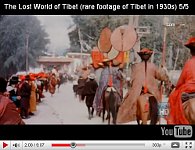| Next > |
|---|
 The fifth and last part of the BBC and BFI (British Film Institute) documentary deals with the popular uprising of the Tibetans in 1959 and the dramatic escape of the Dalai Lama to India. And last but not least with the inactivity of the world community towards the plight of the Tibetan people.
The fifth and last part of the BBC and BFI (British Film Institute) documentary deals with the popular uprising of the Tibetans in 1959 and the dramatic escape of the Dalai Lama to India. And last but not least with the inactivity of the world community towards the plight of the Tibetan people.
The Tragedy of the Tibetan People
In spring time of 1959 the situation in Lhasa had become extremely tense. Chinese soldiers were patrolling in the streets and even on the roofs of the Norbulingka Palace and Jokhang Temple. The situation escalated when on short term an invitation reached the 14th Dalai Lama to attend a dance performance at the nearby Chinese military headquarters. It was the expressed request of the Chinese that his bodyguards should be unarmed.
Rumors had spread among the population of Lhasa that the Chinese planned the arrest and killing of the Dalai Lama. Intelligence reports reached the Tibetan government that the Chinese were about to bomb the Norbulingka Palace, the summer residence of the Dalai Lama.
Thousands of Tibetans gathered around the Norbulingka to protect their spiritual and religious leader.
Escape of the Dalai Lama
That very night, the Dalai Lama disguised as an ordinary Tibetan soldier left the Norbulingka. More than two weeks later the small group of refugees arrived in India, exhausted but safe. Prime Minister Nehru granted the young Dalai Lama asylum - against hefty Chinese protest.
Brutal Chinese Crackdown in Tibet
A few days after the escape the Chinese began with the systematic shelling of the Norbulingka Palace, the Jokhang Temple and the Potala Palace. Thousands were arrested, tortured and killed, hundred thousands put into labor camps. The Tibetan society was demolished. Monasteries were looted and destroyed. Monks and nuns were even forced to marry each other against their will. 80,000 desperate Tibetans fled the country southward over high Himalayan mountain passes.
The Inactivity of the World Community
From Dharamsala, his new exile residence, the Tibetan government in exile took the case to the United Nations. The UN Assembly adopted three resolutions, but the International community refused to intervene.
Dieter Wanczura, October 2010.







